
Health Sciences North is a teaching hospital in Greater Sudbury, Ontario, Canada. HSN offers a variety of programs and services, with regional programs in the areas of cardiac care, oncology, nephrology, trauma and rehabilitation. Patients visit HSN from a wide geographic area across northeastern Ontario.

The Temerty Faculty of Medicine is the medical school of the University of Toronto. Founded in 1843, the faculty is based in Downtown Toronto and is one of Canada's oldest institutions of medical studies, being known for the discovery of insulin, stem cells and the site of the first single and double lung transplants in the world.

Markham Stouffville Hospital is an acute care community hospital with two sites: the Markham site, with diagnostic and emergency services, and clinical programs in childbirth, children's health, surgery, medicine, cancer care and mental health; and the Uxbridge site, a 20-bed hospital offering some inpatient and emergency services. In the 2019-2020 fiscal year there were almost 20,000 inpatient stays with an average length of stay of 4.6 days, and 106,000 emergency department visits.
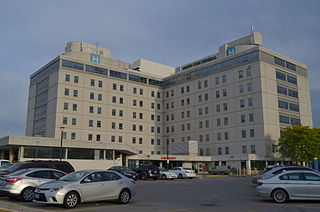
North York General Hospital (NYGH) is a teaching hospital in Toronto, Ontario, Canada. Primarily serving the North York district, as well as southern York Region, it offers acute care, ambulatory and long-term services at multiple sites. It is one of Canada's leading community academic hospitals and is affiliated with the University of Toronto. NYGH is one of the three constituent hospitals of the Peters-Boyd Academy of the University of Toronto Faculty of Medicine.
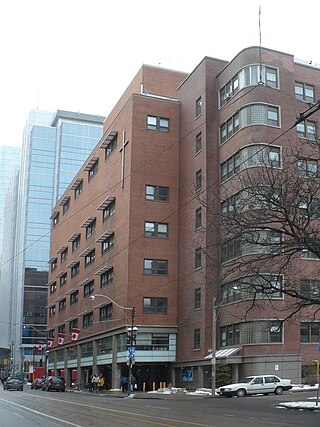
St. Michael's Hospital is a teaching hospital and medical centre in Toronto, Ontario, Canada. It was established by the Sisters of St. Joseph in 1892 with the founding goal of taking care of the sick and the poor of Toronto's inner city. The hospital provides tertiary and quaternary services in cardiovascular surgery, neurosurgery, inner city health, and therapeutic endoscopy. It is one of two Level 1 adult trauma centres in Greater Toronto, along with the larger Sunnybrook Health Sciences Centre. As trauma centres, both St. Michael's and Sunnybrook are equipped with helipads. It is one of several teaching hospitals of the University of Toronto Faculty of Medicine and is part of the Unity Health Toronto hospital network.

Sunnybrook Health Sciences Centre (SHSC), commonly known as Sunnybrook Hospital or simply Sunnybrook, is an academic health science centre located in Toronto, Ontario, Canada. The hospital is the largest trauma centre in Canada. It is accredited as a Level I trauma centre by the Trauma Association of Canada and the American College of Surgeons, the first hospital outside of the United States to achieve ACS accreditation. Sunnybrook is a teaching hospital fully affiliated with the University of Toronto. The hospital is home to Canada's largest veterans centre, in the Kilgour Wing and the George Hees, which cares for World War II and Korean War veterans.

Mackenzie Richmond Hill Hospital is a hospital in Richmond Hill, Ontario, Canada and one of four in York Regional Municipality. Mackenzie Health in Richmond Hill is part of the Local Health Integration Network (LHIN) Hospital Partnerships.
Ricky Kanee Schachter, FRCP(C), CM was a dermatologist who practiced in the Toronto area, and was invested as a Member of the Order of Canada in 1998, as "a researcher, teacher, administrator and healer, whose work in the areas of skin cancer and psoriasis has improved the lives of her patients, and inspired fellow researchers across Canada."
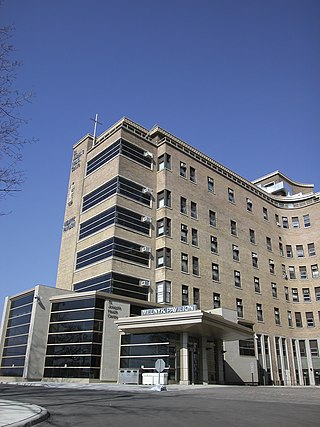
St. Joseph's Health Centre is a large teaching hospital in western Toronto, Ontario. It is located west of downtown Toronto, along the Lake Ontario shore at the intersection of The Queensway and Sunnyside Avenue, just west of Roncesvalles Avenue. It was founded in 1921 by the Sisters of St. Joseph order on the site of an orphanage. The same order also founded St. Michael's Hospital in Toronto in 1892.

Michael Garron Hospital (MGH), formerly Toronto East General Hospital (TEGH), is a community teaching hospital located at 825 Coxwell Avenue in East York, Toronto, Ontario, Canada.
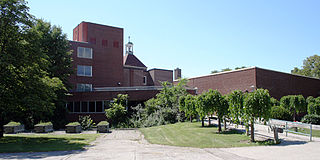
St. John's Rehab, part of Sunnybrook Health Sciences Centre, is solely dedicated to specialized rehabilitation. As the site of Canada's only dedicated organ transplant rehabilitation program and Ontario's only dedicated burn rehabilitation program, the hospital develops individually customized inpatient and outpatient rehabilitation services.
Anita Rachlis, M.D. is a Canadian HIV/AIDS researcher and is the principal author of the HIV treatment guidelines in Canada. She is an associate scientist at the Sunnybrook Research Institute, Sunnybrook Health Sciences Centre, in Toronto, Ontario, Canada.
Winchester District Memorial Hospital (WDMH) is a rural teaching hospital located in Winchester, Ontario. WDMH has a 24/7 emergency, childbirth centre and diagnostic imaging facilities including digital mammography and CT scans. It offers in-patient medical and surgical services, as well as day surgery and outpatient specialty clinics. WDMH is a hub site for cancer care, dialysis and cataract surgery. WDMH leads the Centre of Excellence for Rural Health and Education - a collaborative that brings together the hospital, local physicians, long-term care, and health and community services.
Kathleen I. Pritchard, is the head of oncology at Sunnybrook Health Sciences Centre in Toronto, Canada, specializing in breast cancer therapies, and leading the clinical trials division of the centre. She has authored numerous studies on women's health, breast cancer, hormone replacement therapy, public health, and research methodology. According to Thomson Reuters, Pritchard was one of the most cited researchers in the world in 2014 and 2015.
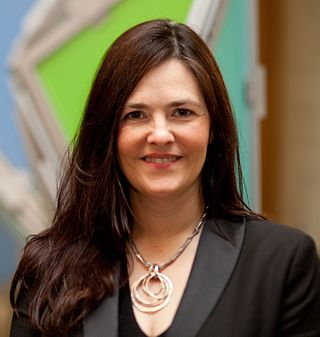
Nancy Baxter is a Canadian surgeon who is a professor and Deputy Executive Dean of the Faculty of Medicine and Health, University of Sydney. She was Head of Melbourne University's School of Population and Global Health from 2020 to 2024 and continues to maintain her appointment as Professor of Surgery in the Department of Surgery and the Institute of Health Policy, Management and Evaluation at the University of Toronto. She is a scientist with the Li Ka Shing Knowledge Institute and is a senior scientist in the Cancer Theme Group with the Institute for Clinical Evaluative Sciences (ICES). Baxter has board certifications through the American Board of Surgery (2000) and the American Board of Colon and Rectal Surgery (2002). She is a Fellow of the American College of Surgeons, the Royal College of Physicians and Surgeons of Canada, and the American Society of Clinical Oncology.
Vassar Brothers Medical Center (VBMC) (formerly Vassar Brothers Hospital) is a 350-bed not-for-profit hospital overlooking the Hudson River in Poughkeepsie, New York. It is part of the Nuvance Health healthcare network and is the major medical center in Dutchess County, New York.
Marion G. Powell was a Canadian physician and medical missionary. Throughout her life, she earned the title of the "mother of birth control in Canada", because of her work in advocating for sex education and birth control. One of her most notable accomplishments is her contribution to helping open one of the first "municipally funded" clinics for birth control in Ontario in 1966. She is also celebrated for her work at the Women's College Hospital (WCH) Bay Centre for Birth Control where she was the Director from 1981 to 1990.

Henrietta Elizabeth Banting or "Lady Banting" was a Canadian physician and the second wife of Sir Frederick Banting, who was awarded the Nobel Prize for his co-discovery of insulin and its therapeutic potential. Banting was the Director of Women's College Hospital's Cancer Detection Clinic from 1958-1971. While working at the Cancer Detection Clinic, she conducted a research study on mammography to measure its effectiveness as a diagnostic tool for breast cancer.
Lynn From was a Canadian physician who specialized in dermatology and skin pathology. From was the pathologist-in-chief at Toronto's Women's College Hospital from 1981 to 1992 and the head of dermatology from 1993 to 2000.
Lorraine L. Lipscombe is a Canadian endocrinologist. In 2021, Lipscombe was appointed the director of the University of Toronto's Novo Nordisk Network for Healthy Populations.















